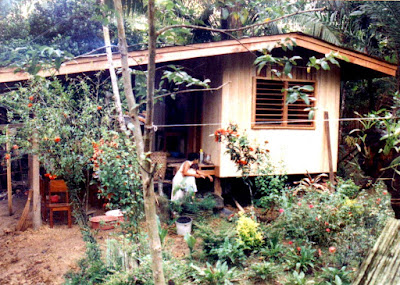Tiya Leoning was my
father’s elder sister. In her younger days, she studied at the Rafael Palma
College in Tagbilaran, Bohol. Years later, when the school attained university
status, it was renamed the University of Bohol which is still existing until
this day. During weekends and other non-school days, Tiya Leoning would stay at
her first cousin’s home in Calunasan in the town of Calape to help the family
tend their their sari-sari store at the ground floor of their two-storey house
which is the largest in the village. Her cousin, Isidoro and his wife,
Felomina, had two college-age daughters Demy and Winnie who were at
home that time. A third daughter,
Lily was in Cebu studying Medicine.
On the evening of March
29, 1963, after a busy day, the family retired in their respective bedrooms in
the upper floor after closing the doors and windows and extinguishing off all
the available lights. Not long after, Isidoro heard a noise somewhere in the
house. He called on Filomena who was in the adjoining room and requested her to
light up the gas lamp nearby to check what’s happening. As soon as the light
brightened the room, she realized that she was facing a gun pointed at her by
an unknown man. The man asked Filomena for her money. Filomina gave the man her
cash box with ten pesos inside. When the man saw that the cash box only
contained ten pesos, he got mad, pointed
the gun closer and even pulled her blouse violently. Then the man entered the
adjoining room where Isidoro was standing with hands raised and shot him. He
also shot Filomina but missed. He then pushed Felomina out of the room.
Another man outside demanded that the door be opened.
The intruder inside ordered Filomena to open the door and came in the second
man with a revover and a flashlight. There was a third man outside acting as a
look-out who would fire his gun every now and then to scare away any neighbor
that might come to the family’s aid.
Filomena and the rest of
the house occupants: her two daughters, Tiya Leoning, her niece named Anastacia
and a 10-year old nephew Cesario were all herded in the living room while the
two men ransacked all the rooms, drawers and cupboards, looking for money and
other valuables. After a while, the look-out outside shouted to his companions,
“Let’s go, na, Bai, I am running low on ‘seeds’ (meaning, ‘bullets’).”
After the men left, they
checked on each other and thanked God that nothing happened to them physically
except for Filomena who was sustaining a head wound caused by the butt of the
gun inflicted on her by the first intruder. But Isidoro was not there among
them. So they searched the whole house. In one corner, was a mound of clean laundry while the basket which used to
contain them was overturned nearby. The
daughters began to pick up the laundry. That’s when they discovered that those
laundry were used by the killers to hide the body of Isidoro sprawled on the
floor, bloody and dead.
A few days later, the
robbers were nabbed by the authorities in the nearby town of Ubay. The police
identified them through the physical descriptions provided by Filomena. They
were thrown in jail and the protracted legal battle began.
Isidoro has a cousin in
Cebu who is a lawyer. He was the only lawyer of the family at that time. He
finished law in the University of the Philippines a few years earlier and
passed the bar exam the previous year. The task of assisting the government
lawyers prosecute the case fell on his shoulders.
On July 26 of that year,
the Court of First Instance of Bohol, Branch 1 convicted the three robbers.
They were meted the harshest penalty: death by electric chair. Fourteen years later, on October 18, 1977,
the Supreme Court of the Philippines en banc affirmed the decision of the lower
court.
The family lawyer who
helped prosecute the case gradually rose to prominence. Eventually, he would
become the 20th Chief Justice of the Supreme Court of the
Philippines. On June 30, 2004, he officiated the swearing in of President
Gloria Arroyo after Erap Estrada was ousted by the People’s Power, Part 2.
After his retirement, he was appointed by Arroyo as the Philippines’ Permanent
Representative to the United Nations. His name is Hilario Gelbolingo Davide Jr.

A pose with the 20th Chief Justice when I visited him
at his residence in Cebu in 2016 with cousin Estrella Herbolingo Melgazo from Australia
Courtesy call on Governor Hilario Davide III at his office in Cebu
Provincial Capitol. Beside me is Atty. Orvi Ortega, provincial legal officer. At the governor's left side is Jessie Melgazo, my childhood friend and neighbor.





